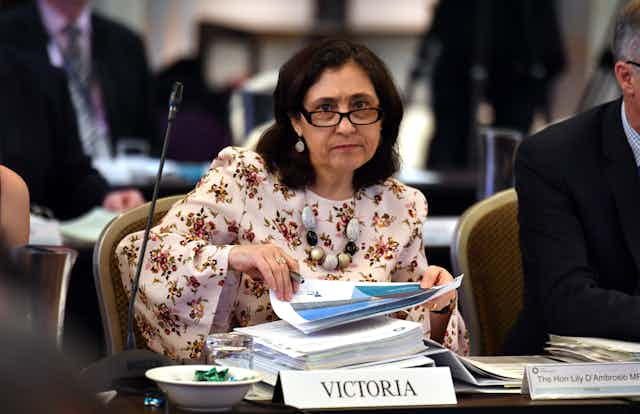The Labor states have kept the National Energy Guarantee (NEG) alive but withheld the in-principle support the federal government had originally hoped to extract from Friday’s meeting of the COAG Energy Council.
The next stage in the NEG battle is the Coalition parties’ crucial meeting on Tuesday, when Prime Minister Malcolm Turnbull and federal energy minister Josh Frydenberg will be confronted by Tony Abbott and other critics who want, in effect, the plan to be made less green.
The Labor jurisdictions are anxious both to ensure that the NEG plan won’t be derailed by the Coalition party room, and to extract concessions from the federal government.
Victoria’s energy minister Lily D’Ambrosio said that her state had withheld its support until conditions that it put earlier this week were met.
D'Ambrosio emphasised that Victoria was “not walking away from the table” but added that Turnbull and Frydenberg needed to “stare down the crazies in their party room”.
Friday’s meeting had at an earlier stage been billed as deadline day for the NEG, but D'Ambrosio said it was “far too soon” to sign off on the policy.
Read more: What's your state's position at the crucial National Energy Guarantee meeting?
Queensland’s acting energy minister Cameron Dick said his state was pleased that Frydenberg “has accepted Queensland’s position that we need the Commonwealth legislation to go through the federal Coalition party room first”.
“The Coalition party room is the biggest risk to energy and price stability, and has been for 10 years, so we need that party room certainty,” he said.
Ministers from the non-Labor states of South Australia and New South Wales said they would have preferred to have moved forward more quickly.
Frydenberg put a positive spin on the meeting, saying that ministers had moved a step closer to implementing the NEG. They had agreed to release an exposure draft of the needed state legislative amendments to implement it. This would be done after a teleconference on Tuesday and the passage of federal legislation through the party room, he said.
“In the words of Energy Security Board Chair Dr Kerry Schott, today’s agreement is a ‘great step forward’,” he said.
But Frydenberg remained intransigent in the face of demands, which have been strongly pushed by Victoria, that the Commonwealth emissions reduction legislation should allow targets to be increased by regulation, rather than requiring more legislation.
Frydenberg said the federal government would not negotiate on that issue, and pointed out that Victoria’s own renewable energy target is enshrined in legislation.
Read more: Emissions policy is under attack from all sides. We've been here before, and it rarely ends well
The Australian Industry Group said that continuing development of the NEG was a positive step. But its chief executive Innes Willox warned: “The COAG Energy Council will soon have to make a real decision or risk condemning Australian industry to years more of damaging uncertainty.”
The Business Council of Australia also welcomed the step forward.
In a round of interviews before the meeting, Frydenberg said he was confident that the governments “will agree to move forward” with the NEG.
“We had a very constructive dinner last night and there was a broad appreciation … of the importance of the National Energy Guarantee, of our responsibilities to deliver lower power prices and to increase the reliability of the system, and the importance of integrating energy and climate policy,” he said.
“So while some of the states maintain some of their concerns with the design, there is broad understanding of the importance of the guarantee.”
Greens climate and energy spokesperson Adam Bandt said that the states were “hopefully realising the NEG is a dud”.

